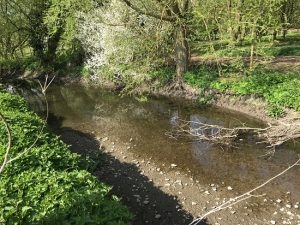New reservoir urgently needed to reduce abstractions from threatened rivers
 In response to Thames Water’s draft 2019 Water Resource Management Plan (WRMP), the Angling Trust has called for the long-promised investment in a new reservoir at Abingdon in Oxfordshire to begin immediately rather than delayed until 2044.
In response to Thames Water’s draft 2019 Water Resource Management Plan (WRMP), the Angling Trust has called for the long-promised investment in a new reservoir at Abingdon in Oxfordshire to begin immediately rather than delayed until 2044.
The Trust believes that the over reliance on demand management and leakage in the current plan is woefully inadequate to save the disappearing chalk streams and other rivers of the south east of England. Thames Water had previously promised to work towards ceasing abstractions from all chalk streams in its area.
Every five years, each water company in England is required to produce a revised WRMP to plan for how the necessary water resources will be provided over the next investment period. Due to the pressures of climate change and population growth, many water companies in areas of ‘water stress’ (particularly the South East) are now producing plans looking ahead over much longer periods. In the case of Thames Water – the company supplying the greatest number of households – plans are looking forwards 80 years.
The last reservoir built in the South East was Farmoor in 1976 and since then the population in the region has increased massively. Ten years ago, in a previous iteration of their WRMP, Thames Water proposed to build a hugely significant new storage reservoir near Abingdon in Oxfordshire. The reservoir has the potential to reduce the reliance of Thames Water and other surrounding water companies on abstractions from chalk aquifers, which provide the lifeblood of our precious chalk streams. This is particularly applicable to Affinity Water, which supplies water to much of the north London population but has virtually no surface water storage facilities whatsoever, relying almost exclusively on abstraction from groundwater supplies. The Abingdon Reservoir, with a capacity of 281 million litres a day, will take surplus water from the Thames in the winter and allow transfers down the river at times of low flows to abstraction points downstream. This in turn will allow reduced abstraction from threatened rivers like the Chess and Colne.
In the latest draft of the WRMP that is currently out for public consultation, Thames Water have sought to avoid investing in increased water storage by pushing back the planned construction of the reservoir until the 2040s. Instead, the company has put an emphasis on reducing leakage by 15% over the next five years and demand management measures, including increased smart metering. However, they have already been heavily fined for failing to hit leakage targets last year and are likely to be so again.
The Angling Trust believes that these measures are inherently high-risk, do not provide the resilience required to manage water supplies in the context of increasingly variable weather events, and offer customers poor value for money. The Trust believes that the only way to ensure reliable water supplies for a growing population and ensure that future abstractions are sustainable is for Thames Water to develop a ‘twin-track approach’ of investment in infrastructure and storage to develop new water supplies and increase resilience, whilst simultaneously bearing down on leakage and demand management.
Thames Water have utilised advanced demographic modelling to project that there are likely to be an additional two million people living in their region by 2045, and an additional five million by 2100. Such population growth, combined with increasingly extreme weather events, means that should no further water resources be developed there will be a shortfall of approximately 864 million litres per day – or the equivalent of six million people being without water.
James Champkin, Campaigns Officer for the Angling Trust, explained: “Most people think of the UK as a wet country, but the South East of England actually experiences a drier climate than Sydney. The South East is designated by the Environment Agency as an area of serious water stress, and its supplies are at a critical point. Last year, many of our most cherished chalk streams around London ran dry for months.
“At the moment, the water companies simply do not have the resilience in infrastructure to cope with dry periods without destroying our rivers but Thames Water now has the opportunity to take a leading role in long-term environmental stewardship. We are calling on them to bring forward the construction of the long-overdue new reservoir at Abingdon to harvest surplus water to use during times of scarcity, and keep our precious rivers flowing. We are also urging anglers to make their voices heard by the deadline of April 29th.”
Paul Jennings, Chairman of the River Chess Association, said: “In the South East of England we have the highest concentration of population, the driest climate in the country and the greatest dependency on groundwater for domestic and business supply. It should be no surprise that the water supply system is under great stress. We have six water companies supplying this region and there is no co-ordinated plan to capture, distribute and supply water. With more volatile and extreme weather this needs to be addressed now, we require immediate additional reservoirs to capture water in times of plenty and pipelines to enable high volume water transfer around the region.”
The Angling Trust has produced a useful guide to assist and encourage anglers, angling clubs and river groups in responding to the public consultation by the April 29th deadline.








